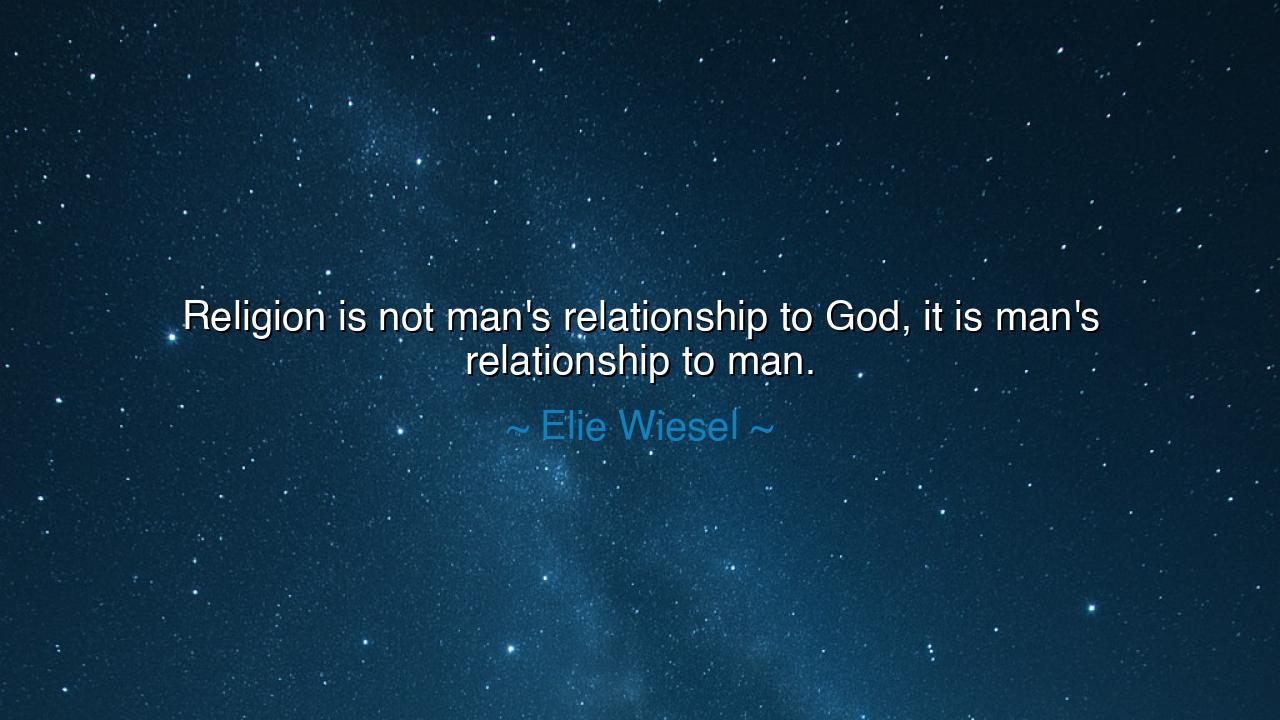
Religion is not man's relationship to God, it is man's






Hear, O children of remembrance, the voice of Elie Wiesel, survivor of fire and witness of silence, who declared: “Religion is not man’s relationship to God, it is man’s relationship to man.” These words, spoken by one who endured the abyss of human cruelty, cut to the very heart of what it means to believe. For Wiesel saw that the holiest prayers mean nothing if they do not shape the way we treat one another. A faith that loves God but despises neighbor is no faith at all—it is an empty echo in the void.
The origin of this saying rises from the ashes of the Holocaust. Wiesel, imprisoned in the death camps of Auschwitz and Buchenwald, watched as men who claimed religion betrayed its essence, standing silent before evil or participating in it. He saw firsthand that the measure of true religion is not in rituals alone, nor in lofty words spoken toward heaven, but in the way human beings treat one another here on earth. In the face of such darkness, Wiesel proclaimed that the bond between man and man is the truest expression of our bond with the Divine.
The meaning of these words is both devastating and luminous. If religion is reduced to ceremonies that ignore suffering, it becomes hypocrisy. But when religion takes shape in compassion, in justice, in mercy toward others, it becomes a living flame. To feed the hungry, to comfort the grieving, to shelter the vulnerable—these acts are greater prayers than any chanted hymn. For as the prophets of old declared: “What does the Lord require of you but to do justice, to love mercy, and to walk humbly with your God?”
History gives us vivid mirrors of this truth. Consider the life of Mother Teresa, who found the face of God not in ornate cathedrals, but in the suffering bodies of Calcutta’s poor. She did not define religion as doctrine alone, but as service—the bond between one human soul and another. In her touch, the dying found dignity; in her care, the abandoned found love. Her life testifies that religion is fulfilled not in separation from others, but in deep communion with them.
Wiesel’s words also remind us of the wisdom of Jesus of Nazareth, who taught that the greatest commandments are to love God and to love one’s neighbor, and that the second is like the first. He declared that whatever you do for “the least of these,” you do for God Himself. Here we see the unity of heaven and earth: that to serve man is to serve God, and to injure man is to offend the Creator. Thus, religion is not a ladder climbing skyward, but a bridge stretched across human hearts.
The lesson for us is urgent: true faith must be visible in our relationships. To claim love for God while despising one’s neighbor is to live a lie. The test of belief is not in creeds recited but in compassion practiced, not in the rituals of the sacred day but in the mercy shown on ordinary days. Every act of kindness is worship. Every act of injustice is blasphemy.
Practical steps stand before you: Examine your faith, whatever its name, and ask whether it lifts others or oppresses them. Begin each day with a small act of kindness, for these are the bricks that build true religion. Defend those who are silenced, comfort those who are forgotten, and forgive where bitterness festers. Let your prayers take form in deeds, so that when others see you, they see love made flesh.
Thus remember the teaching of Elie Wiesel: Religion is man’s relationship to man. If you honor this truth, your life will become a sanctuary, your words will become prayers, your actions will become offerings. And in the end, you will find that by loving your fellow man, you have already walked hand in hand with God.






AAdministratorAdministrator
Welcome, honored guests. Please leave a comment, we will respond soon